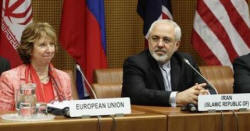|
 Iran,
Six Powers Hold 'Useful' Nuclear Talks; Agreement Elusive Iran,
Six Powers Hold 'Useful' Nuclear Talks; Agreement Elusive
 Send a link to a friend
Send a link to a friend
[May 08, 2014]
By Louis Charbonneau
NEW YORK (Reuters) - Iran and six world
powers held more "useful" talks on Tehran's nuclear program, both sides
said, although a Western diplomat said they were still struggling to
overcome deep disagreements on the future of Iranian atomic
capabilities.
|
|
 Their remarks came after two days of expert-level talks in New
York between Iran and the United States, France, Germany, Britain,
China and Russia on a long-term accord meant to end by a deadline of
July 20 a decade-old dispute over suspicions that Tehran has sought
the means to develop nuclear weapons. Their remarks came after two days of expert-level talks in New
York between Iran and the United States, France, Germany, Britain,
China and Russia on a long-term accord meant to end by a deadline of
July 20 a decade-old dispute over suspicions that Tehran has sought
the means to develop nuclear weapons.
"(The six powers) and Iranian technical experts had a useful meeting
on 6-7 May in New York," an EU spokesman said.
"The talks aimed at further deepening of the knowledge on the issues
and to contribute to the preparations for the next round of
(senior-level) negotiations on a comprehensive agreement due to take
place next week in Vienna."
The talks were a prelude to next week's political-level negotiations
in the Austrian capital Vienna.
Iranian nuclear negotiator Hamid Baeedinejad also described the New
York discussions as "useful", the official IRNA news agency said on
Thursday. "Parties involved in technical and expert will continue
discussions to prepare for the next round of talks next week in
Vienna," Baeedinejad said.

The West suspects Iran has engaged in nuclear
research-and-development (R&D) work geared to yielding bombs. Iran
says its nuclear program is entirely peaceful, intended solely for
generating electricity and isotopes usable in cancer treatment.
Iran's priority in the negotiations is to bring about an end to
biting international sanctions that have damaged its oil-dependent
economy by forcing a sharp reduction in crude exports from the
Islamic Republic.
A Western diplomat, who spoke to Reuters on condition of anonymity,
said Iran and the six powers had made progress on scenarios for
resolving a dispute over Iran's Arak nuclear reactor, which could
yield significant quantities of bomb-grade plutonium if it is
brought on line without major modifications.
"More difficult for getting a deal is uranium enrichment in general
and centrifuge R&D," the diplomat said.
ISRAELI SCEPTICISM, THREATS
Enrichment is a problematic issue for Israel, Washington's principal
ally in the Middle East. Israel insists Iran be stripped of
enrichment capabilities under a potentially imminent nuclear deal, a
demand that risks opening a new Israeli-United States rift, Israeli
officials say.
Western diplomats close to the negotiations say banning all
enrichment work in Iran is unrealistic given the size of the
program, which Tehran equates with national sovereignty.
But Israel has threatened to attack Iran if it deems diplomacy to be
ineffective in reining in its arch-enemy, something that could touch
off a wider Middle East war.
[to top of second column] |

The six powers and Iran are striving to find an acceptable
compromise that would enable Tehran to carry on with limited
enrichment that would not give the Iranians the ability to stockpile
large amounts of purified uranium, which constitutes the core of
atomic bombs if enriched to a high level.
Such restrained enrichment, geared solely to yield energy for
civilian uses, would be closely monitored by the International
Atomic Energy Agency, the U.N. nuclear watchdog.
Earlier this week Deputy Foreign Minister Sergei Ryabkov said senior
officials from the countries involved in the talks now plan to start
drafting a text of a possible deal.
"As a result of this round, we should at least get some elements of
the agreed text and elements of the common text," he told state-run
RIA news agency in an interview. Ryabkov did not give details on
what areas the partial agreement he expects to come out of next
week's talks in Vienna might cover.
Analysts and diplomats say there is political will on both sides to
strike a deal but that it will still be very difficult to overcome
key differences, especially on the permissible scope of uranium
enrichment.
The six powers want an agreement that would ensure the Islamic
Republic could not assemble a bomb any time soon.
After years of an increasingly hostile standoff with the West,
Iran's election last year of the pragmatist Hassan Rouhani as
president paved the way for a cautious thaw in relations.
(Additional reporting by Michelle Moghtader in Dubai; editing by
Mark Heinrich)
[© 2014 Thomson Reuters. All rights
reserved.] Copyright 2014 Reuters. All rights reserved. This material may not be published,
broadcast, rewritten or redistributed.

 |